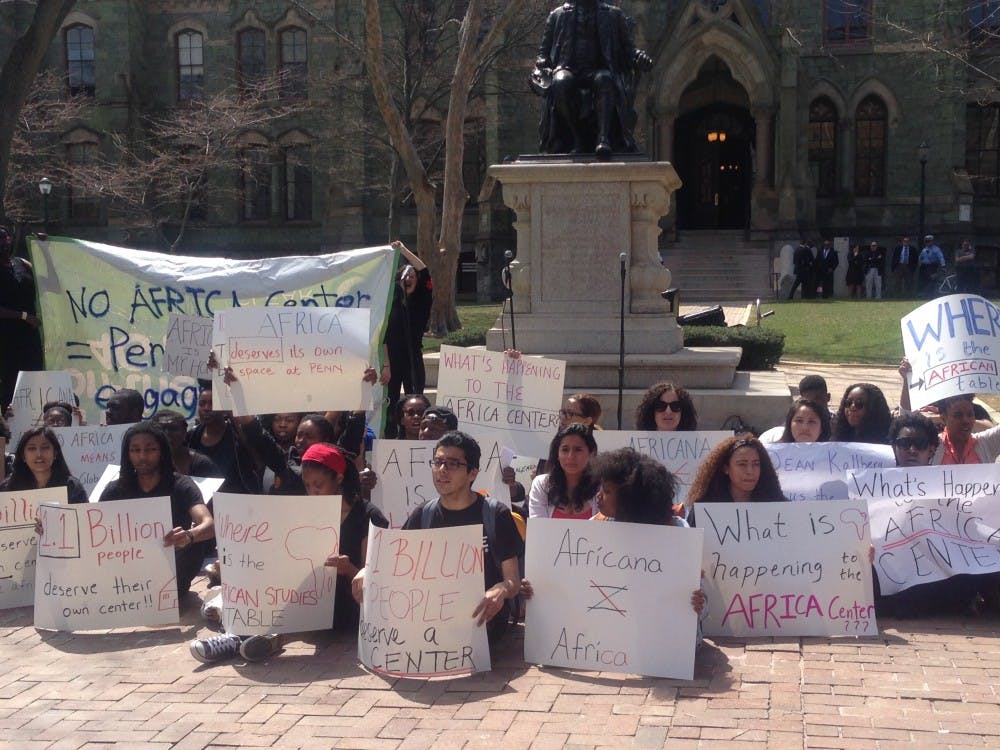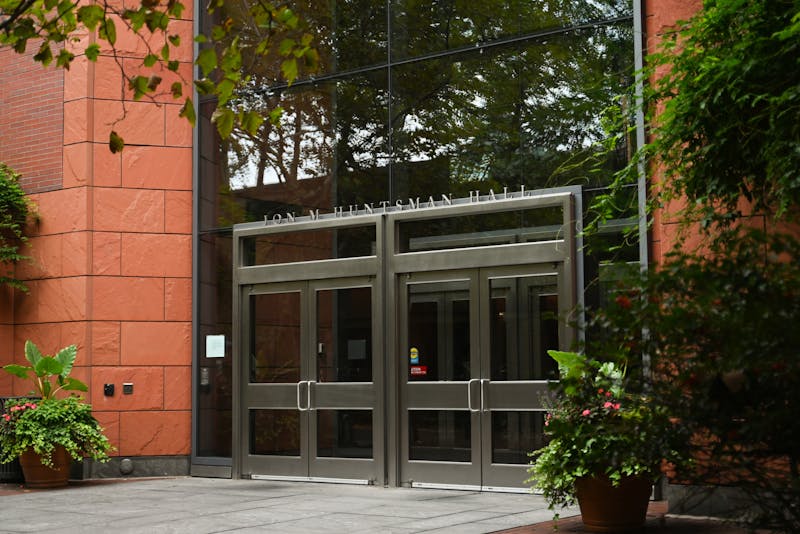
The protest was sparked by the announcement that Penn's Africa Center will close and the African Studies department will merge with the Africana Studies center.
Credit: Jessie Washington / Staff ReporterLast month, Major General Muhammadu Buhari was elected to lead Nigeria, Africa’s most populous country, in an historic election that brought worldwide acclaim as it symbolized a new era in the country’s democracy. A few days later, al-Shabaab terrorists stormed a university campus in Garissa, Kenya, leaving at least 147 students and staff dead and sparking worldwide outrage and shows of support for the affected Kenyans. Journalists from The New York Times filed reports from Kano, Nigeria, and Gatundu, Kenya, within a week in the wake of these disparate events. (Incidentally, Kenya and Nigeria are two of the 10 fastest growing economies in the world.)
Amidst all this, South African comedian Trevor Noah was announced as Jon Stewart’s replacement on “The Daily Show” here in the U.S., as Noah’s countrymen rallied to remove Cecil Rhodes’ statue from the University of Cape Town’s campus. The world is changing, and Africa is at the frontier of that transformation.
Africa is a diverse continent, with a great number of political, economic and cultural strides being taken, in line with the “Africa rising” narrative. Despite the ongoing threats from al-Shabaab and Boko Haram and irritation with “Presidents for Life,” the continent continues to develop rapidly. This is not only important for the moment we live in but for the near future. According to the UN, by 2050, 24 percent of the world’s population will be African, with a median age of 25.4. Contrast this to the Americas, which will make up 13 percent of the world’s population, and Europe, which will make up only 7 percent.
And yet, at this very moment, the University of Pennsylvania — our alma mater — has decided to shut down the Africa Center, where we were, and many others have been, African Studies majors. The abrupt closure of the Center is coupled with the news that the non-language parts of African studies will be merged with the Africana Studies Department. We are not as concerned about the joint program: many peer institutions have combined African and Africana departments. Ultimately, students and faculty interested in African Studies would probably succeed in a combined department and even find opportunities for important interdisciplinary work.
We, however, take exception to the fact that the Africa Center, the only formal space dedicated to Africa at Penn, is shutting down. Our peer institutions with combined departments also have separate centers focused on Africa. We have to ask: Does an elite and well-endowed institution like the University of Pennsylvania really lack the funds to support a standalone Africa Center? We wonder.
With Africa in global focus, what does it mean to shut down the Africa Center at Penn? First, it undercuts Penn as a globally engaged institution. Surely 1.1 billion people merit a substantial and visible level of engagement on such a globally minded campus. Second, it deprives all students of the ability to engage with the continent on a more personal platform, not only through degree-seeking programs, but through speaker series, student symposia and cultural exchange events, for instance.
We ask, therefore, that the SAS Deans and the Vice Provost for Global Initiatives reconsider this decision and reinstate the Africa Center at Penn for the service of its African students and indeed, the University at large. In so doing, we ask that Penn join its academic counterparts in positioning Africa as a continent worthy of serious scholarship and investment, symbolized by its own well-funded Center.
As Kwame Nkrumah, Ghana’s first president and fellow Penn alumnus wrote in his 1970 book “Class Struggles in Africa,” “In Africa where so many different kinds of political, social and economic conditions exist it is not an easy task to generalize on political and socio-economic patterns. Remnants of communalism and feudalism still remain and in parts of the continent ways of life have changed very little from traditional times. In other areas a high level of industrialization and urbanization has been achieved. Yet in spite of Africa’s socioeconomic and political diversity it is possible to discern certain common political, social and economic conditions and problems.” Nkrumah’s words still resonate today, and a dedicated Africa Center will allow Penn’s students and faculty to explore these conditions more robustly.
ADERINOLA “DERIN” ADEJARE is a 2013 College graduate, born and raised in Nigeria until the age of 10. Her email address is adejare@alumni.upenn.edu.
ANGELA DdAMBA is a 2011 College graduate, born in Uganda and raised in Kenya. Her email address is angelana@alumni.upenn.edu.
The Daily Pennsylvanian is an independent, student-run newspaper. Please consider making a donation to support the coverage that shapes the University. Your generosity ensures a future of strong journalism at Penn.
DonatePlease note All comments are eligible for publication in The Daily Pennsylvanian.







